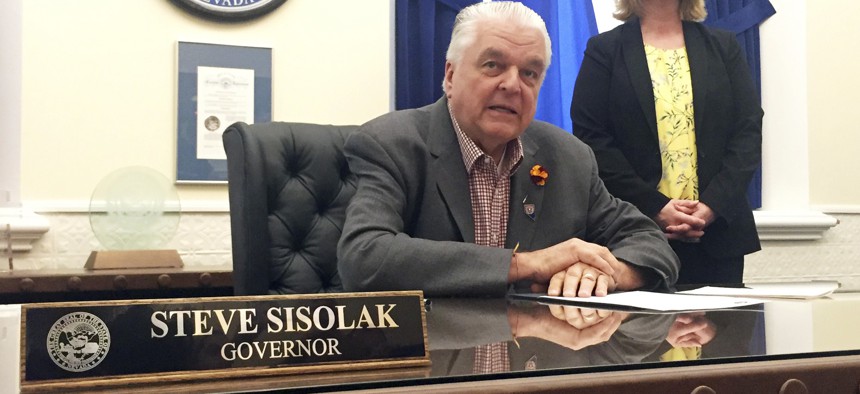Over 20,000 State Employees are About to Gain Collective Bargaining Rights

Nevada Gov. Steve Sisolak sits at his desk at the Capitol in Carson City in May. Sisolak says he plans to sign legislation expanding collective bargaining rights for public workers in the state. AP Photo/Ryan Tarinelli
Nevada state employees haven’t been able to collectively bargain through unions. That’s on the cusp of changing.
Nevada lawmakers have passed legislation that clears the way for about 22,000 state employees, such as prison staff, custodial workers and tax examiners, to join labor unions and bargain over employment terms and conditions.
Gov. Steve Sisolak, a Democrat elected last year, plans to sign the bill, which was backed by labor groups. The American Federation of State, County and Municipal Employees touted it as the largest statewide expansion of collective bargaining rights in 16 years.
It comes in the wake of a U.S. Supreme Court decision that was widely seen as a threat to the finances of public sector labor unions, and as conservative activist groups are helping bring lawsuits and using other tactics with the aim of weakening the clout of the labor groups.
Local government employees in Nevada have had collective bargaining rights for about 50 years. But state employees have not. The bill effectively expands the system now in place for local government employees to cover eligible state workers.
“Senate Bill 135 gives state workers a seat at the table for the very first time in Nevada history,” Sisolak said in a statement. “I look forward to continuing to work with stakeholders and legislators in the interim toward greater empowerment for our hardworking state employees.”
But the bill comes with some notable caveats. The governor is free to include funding levels for wages in the executive budget proposal without it being construed as a failure to bargain in good faith, giving the executive branch sway over pay.
And insurance benefits for the state workers will not be subject to bargaining because they are guided by other laws.
The bill is expected to result in 11 new labor contracts for different categories of employees, Michael Brown, the state’s director of business and industry, told lawmakers.
Issues subject to mandatory bargaining are included in a list already outlined in state law that was adopted for local government workers the 1970s. This will enable unions to bargain over items like vacation and sick leave, holidays, work hour requirements, safety and some procedures related to cutting employees.
“I think that we all know that when employees have a say in their workplace we all benefit, we all gain,” Sen. David Parks, a Democrat, said in testimony about the bill.
Parks noted in his remarks that the legislation includes provisions meant to prohibit strikes.
AFSCME Nevada, a political action committee associated with the large public sector union, reported $3,745,863 in spending last year. The group was among Sisolak’s supporters in his run for governor, and documented $147,943 of in-kind expenses in September for staff time tied to canvassing for his election.
A Nevada affiliate of the Democratic Governors Association recorded a $850,000 payment to AFSCME Nevada last June 5—prior to Sisolak prevailing in a hard-fought Democratic primary.
Brown couldn’t say when asked by a lawmaker during a hearing last weekend about how many employees would not be covered by the collective bargaining legislation. And a spokesperson for his department didn’t have the number immediately available on Friday.
The state’s 2018 financial report says it has about 30,300 full-time equivalent state government employees. Brown told lawmakers in his testimony there are currently labor contracts in Nevada covering about 85,000 employees across 183 local governments.
In Nevada’s Assembly, the bill passed on Sunday on a final 28-13 vote, with all Republican voting against it. It cleared the Senate on Saturday on a 13-8 party line vote, with Democrats in support and Republicans opposed.
“I have concerns about the long term significant fiscal impact this bill could have on the state, as well as the fact that I think this Legislature is giving up significant authority to the executive branch of government,” Republican state Sen. Ben Kieckhefer said on the Senate floor, according to the The Nevada Independent.
Last year’s Supreme Court ruling in Janus v. American Federation of State, County, and Municipal Employees, Council 31 barred public sector unions from collecting “agency” or “fair-share” fees from non-members who are apart of workforces they represent.
This raised concerns about the possibility of coming revenue and membership losses for the labor groups.
State and local public sector union membership in the U.S. last year fell to around 6.7 million, from 6.8 million in 2017, according to U.S. Department of Labor figures. But the local government sector actually saw membership gains, while the state sector experienced losses.
AFSCME said in a statement this week that unions are experiencing the highest level of public support in more than a decade.
“We will continue to fight for similar progress around the country,” Lee Saunders, the union's president, said after the Nevada bill passed.
Delaware also recently expanded collective bargaining rights for state employees. Gov. John Carney, a Democrat, signed a bill on May 30 that his office says will allow about 2,000 additional state employees to negotiate for higher wages.
“State employees protect our communities, teach our children, clear our streets, and provide critical services for Delaware families,” Carney said. “They ought to be paid what they’re worth.”
Correction: An earlier version of this story misstated the vote tally in the Assembly.
Bill Lucia is a Senior Reporter for Route Fifty and is based in Olympia, Washington.
NEXT STORY: A State Forges Ahead With a Controversial Plan to Control Pension Costs






